|
|
|
Sort Order |
|
|
|
Items / Page
|
|
|
|
|
|
|
| Srl | Item |
| 1 |
ID:
127211
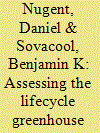

|
|
|
|
|
| Publication |
2014.
|
| Summary/Abstract |
This paper critically screens 153 lifecycle studies covering a broad range of wind and solar photovoltaic (PV) electricity generation technologies to identify 41 of the most relevant, recent, rigorous, original, and complete assessments so that the dynamics of their greenhouse gas (GHG) emissions profiles can be determined. When viewed in a holistic manner, including initial materials extraction, manufacturing, use and disposal/decommissioning, these 41 studies show that both wind and solar systems are directly tied to and responsible for GHG emissions. They are thus not actually emissions free technologies. Moreover, by spotlighting the lifecycle stages and physical characteristics of these technologies that are most responsible for emissions, improvements can be made to lower their carbon footprint. As such, through in-depth examination of the results of these studies and the variations therein, this article uncovers best practices in wind and solar design and deployment that can better inform climate change mitigation efforts in the electricity sector.
|
|
|
|
|
|
|
|
|
|
|
|
|
|
|
|
| 2 |
ID:
072722


|
|
|
| 3 |
ID:
094405


|
|
|
|
|
| Publication |
2010.
|
| Summary/Abstract |
This article investigates the barriers to energy efficiency at the residential sector within one province in China and explores patterns of household electricity consumption. The article presents the results of a survey questionnaire distributed to more than 600 households in Liaoning Province, field research at various Liaoning government agencies, and research interviews of Liaoning government officials to determine the efficacy of their energy efficiency efforts in China. It then investigates the extent that electricity consumers have taken advantage of energy efficiency opportunities relating to more efficient lights, water heaters, appliances, air-conditioners and heaters, and better energy-efficiency labels. The article also assesses the degree that electricity users have become more aware about electricity prices and their levels of consumption, and touches on the connection between rising levels of income and electricity use. It concludes by providing recommendations for how to improve efforts to promote conservation and reduce electricity load growth in Liaoning Province and beyond.
|
|
|
|
|
|
|
|
|
|
|
|
|
|
|
|
| 4 |
ID:
109331


|
|
|
|
|
| Publication |
2011.
|
| Summary/Abstract |
Using a case-study, inductive, narrative approach, this article explores the history, drivers, benefits, and barriers to the Bakun Hydroelectric Project in East Malaysia. Situated on the island of Borneo, Bakun Dam is a 204 m high concrete face, rock filled dam on the Balui River in the Upper Rajang Basin in the rainforests of Sarawak. Bakun Dam and its affiliated infrastructure could be the single largest and most expensive energy project ever undertaken in Southeast Asia. Based on data collected through site visits, original field research in Sarawak, and more than 80 research interviews, the article begins by teasing out the complex history and drivers behind the Bakun project before identifying a set of potential social, political, and economic benefits the project could deliver. It then delves into six sets of barriers in the technical, economic, political, legal and regulatory, social, and environmental realms. We find that Bakun illustrates how centralized energy megaprojects, while ostensibly championed for reasons of economies of scale and the ability to bring about transformational change in the shortest period of time, often fail to address broader development goals such as fighting energy poverty and improving the livelihoods of the local communities they are supposed to serve.
|
|
|
|
|
|
|
|
|
|
|
|
|
|
|
|
| 5 |
ID:
116765


|
|
|
|
|
| Publication |
2012.
|
| Summary/Abstract |
This communication discusses climate change adaptation efforts underway in Vanuatu. In particular, it uncovers why community-based approaches to adaptation are more likely to bear fruit than ones driven from the top-down at the national level. The authors make this claim based on early evidence that small-scale projects (a) support community ownership over adaptation, (b) provide ongoing technical learning lessons (c) relieve pressure from capacity constraints at national administrative bodies, and (d) expedite implementation by avoiding cumbersome multilateral procedures. The first section discusses its research methods and presents important characteristics of the Vanuatu economy, people and geography. The communication then moves on to discuss Vanuatu's vulnerability to the effects of climate change. It specifically investigates on-going efforts to adapt to natural climatic hazards in Vanuatu. Early evidence and analysis reveals lessons salient for energy and climate policy.
|
|
|
|
|
|
|
|
|
|
|
|
|
|
|
|
| 6 |
ID:
102347
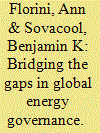

|
|
|
|
|
| Publication |
2011.
|
| Summary/Abstract |
Energy constitutes a rich, but underexplored, arena for global governance
scholars and policymakers. The world is currently on an unsustainable and
conflict-prone track of volatile and unreliable supply of energy fuels, vulnerable
infrastructure, massive environmental degradation, and failure to
deliver energy services to an enormous proportion of the global population.
Changing to a different path will be a monumental global governance
endeavor that will require bridging multiple issue areas, regimes,
and policy silos. Meeting that challenge will require a greatly expanded research
agenda aimed at understanding the institutions, interests, and concerns
that do and could shape global energy governance. In this article, we
lay out key energy-related global issues and explore some of the connections
among them to suggest an initial research agenda for global governance
scholars.
|
|
|
|
|
|
|
|
|
|
|
|
|
|
|
|
| 7 |
ID:
116634


|
|
|
|
|
| Publication |
2012.
|
| Summary/Abstract |
This study explores how Asian energy security issues are perceived in China, India, and Japan. It investigates perceptions of 16 energy security challenges drawn from an extensive survey, as well as how such conceptions differ between Asian energy consumers and across these dimensions of energy security.
|
|
|
|
|
|
|
|
|
|
|
|
|
|
|
|
| 8 |
ID:
103465
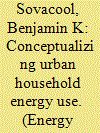

|
|
|
|
|
| Publication |
2011.
|
| Summary/Abstract |
This article begins by defining energy services and identifying how they differ according to sector, urban and rural areas, and direct and indirect uses. It then investigates household energy services divided into three classes: lower income, middle income, and upper income. It finds that the primary energy technologies involved with low-income households involve a greater number of fuels and carriers, ranging from dung and fuelwood to liquefied petroleum gas and charcoal, but a fewer number of services. Middle-income households throughout the world tend to rely on electricity and natural gas, followed by coal, liquefied petroleum gas, and kerosene. These homes utilize energy to produce a much broader range services. The upper class or rich have access to the same energy fuels, carriers, and technologies as middle-income homes and families, but consume more energy (and more high luxury items). The study highlights how focusing on energy services reorients the direction of energy policy interventions, that energy services are neither uniform nor innate, and by noting exciting areas of potential research.
|
|
|
|
|
|
|
|
|
|
|
|
|
|
|
|
| 9 |
ID:
088222


|
|
|
|
|
| Publication |
2009.
|
| Summary/Abstract |
This article explores the threats that wind farms pose to birds and bats before briefly surveying the recent literature on avian mortality and summarizing some of the problems with it. Based on operating performance in the United States and Europe, this study offers an approximate calculation for the number of birds killed per kWh generated for wind electricity, fossil-fuel, and nuclear power systems. The study estimates that wind farms and nuclear power stations are responsible each for between 0.3 and 0.4 fatalities per gigawatt-hour (GWh) of electricity while fossil-fueled power stations are responsible for about 5.2 fatalities per GWh. While this paper should be respected as a preliminary assessment, the estimate means that wind farms killed approximately seven thousand birds in the United States in 2006 but nuclear plants killed about 327,000 and fossil-fueled power plants 14.5 million. The paper concludes that further study is needed, but also that fossil-fueled power stations appear to pose a much greater threat to avian wildlife than wind and nuclear power technologies.
|
|
|
|
|
|
|
|
|
|
|
|
|
|
|
|
| 10 |
ID:
103529


|
|
|
|
|
| Publication |
2011.
|
| Summary/Abstract |
In August 2009, after 54 years of virtually unbroken rule, Japan's Liberal Democratic Party (LDP) was ousted from power by the Democratic Party of Japan (DPJ). The DPJ's campaign platform included a pledge to facilitate extreme reductions in greenhouse gas (GHG) emissions. Yet, at the COP16 meeting in Cancun, Japan announced that it would not accept further emission reduction targets without broader commitment from all nations. This paper seeks to explain this dichotomy by employing a targeted stakeholder evaluation based on surveys with 321 Japanese citizens to assess the extent to which influential stakeholder groups in Japan supports a potentially costly transition to a low-carbon energy infrastructure amidst severe economic challenges that the nation faces. Findings help explain Japan's adversarial role in COP16 negotiations in Cancun, despite the stated GHG reduction ambitions of Japan's current ruling party. The analysis concludes that if the DPJ does embrace aggressive CO2 reduction targets in the future, the strategic focus will likely mirror the former ruling party's energy policy of bolstering nuclear power generation capacity and promoting energy efficiency improvements while exhibiting lukewarm commitment to supporting capacity development in alternative sources of energy supply such as solar panels and wind turbines.
|
|
|
|
|
|
|
|
|
|
|
|
|
|
|
|
| 11 |
ID:
079342


|
|
|
|
|
| Publication |
Dordrecht, Springer, 2007.
|
| Description |
x, 371p.
|
| Standard Number |
9781402055638
|
|
|
|
|
|
|
|
|
|
|
|
Copies: C:1/I:0,R:0,Q:0
Circulation
| Accession# | Call# | Current Location | Status | Policy | Location |
| 052627 | 333.790973/SOV 052627 | Main | On Shelf | General | |
|
|
|
|
| 12 |
ID:
150744
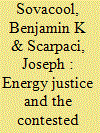

|
|
|
|
|
| Summary/Abstract |
Ecuador's progressive Yasuní-ITT Initiative, operational 2007 to 2013, would have left almost one billion barrels of crude oil locked in perpetuity beneath one of the most intact and diverse nature reserves on the planet. The project attempted to “strand” these oil assets in order to protect biodiversity, respect the territory of indigenous peoples, combat climate change, and encourage more sustainable economic development. The Yasuní-ITT proposal would have had the international community pay Ecuador $3.6 billion—roughly half the value of the oil found there—in exchange for not developing the Ishpingo Tambococha Tiputini (ITT) oilfields. Funds would have been placed into social and environmental development programs and the promotion of domestic renewable energy. Instead, the project collected only $13 million and succumbed to a series of challenges including limited financing, intense political pressure, a national commitment to oil, and carbon leakage. This article summarizes the history, benefits, and insurmountable obstacles facing the Yasuní-ITT Initiative and presents six broader lessons and implications for climate and energy analysts, practitioners, and policymakers. It questions the political viability of and serves as a stark warning against those promoting and advocating policies centered on carbon budgets, stranded assets, negative emissions, and carbon revenue streams.
|
|
|
|
|
|
|
|
|
|
|
|
|
|
|
|
| 13 |
ID:
125585


|
|
|
|
|
| Publication |
2013.
|
| Summary/Abstract |
Denmark is arguably the most energy secure and sustainable country in the Organization of Economic Cooperation and Development (OECD). The country has reduced its dependence on foreign sources of energy to zero and become self-sufficient in its own energy production and use, offering important lessons for other nations around the world. This study explores the core of Denmark's successful approach: a commitment to energy efficiency, prolonged taxes on energy fuels, electricity, and carbon dioxide, and incentives for combined heat and power (CHP) and wind turbines. Through these commitments, the study shows how Denmark transitioned from being almost 100 percent dependent on imported fuels such as oil and coal for their power plants in 1970 to becoming a net exporter of fuels and electricity today. The country leads the world in terms of exportation of wind energy technology, with a hold on roughly one-third of the world market for wind turbines. It was able to phase out the use of virtually all oil-fired power plants in less than five years and implemented a progressive moratorium on future coal-fired power plants in the 1990s. Their most recent strategy seeks to achieve 30 percent of total energy supply from renewable energy by 2025.
|
|
|
|
|
|
|
|
|
|
|
|
|
|
|
|
| 14 |
ID:
110441


|
|
|
|
|
| Publication |
2011.
|
| Summary/Abstract |
The energy security conundrum - how to equitably provide available, affordable, reliable, efficient, and environmentally benign energy services - is a technology and policy challenge, perhaps unlike any other. The recent article on an energy security in the Asia Pacific by Vlado Vivoda is an excellent starting point for how to best capture the unique energy security challenges facing the region. This article builds on Vivoda's work, but also points out some shortcomings with his analysis.
|
|
|
|
|
|
|
|
|
|
|
|
|
|
|
|
| 15 |
ID:
110417


|
|
|
|
|
| Publication |
2011.
|
| Summary/Abstract |
The Small Renewable Energy Power (SREP) Program was the premier policy mechanism implemented by the national government to promote small-scale renewable electricity in Malaysia from 2001 to 2010. However, it managed meet less than 3 percent of its original goal by 2005. This study investigates what happened. More specifically, using a qualitative semi-structured interview approach with data presented in a narrative format, it answers the following five questions: (1) What are the primary energy policy and security challenges facing Malaysia? (2) What were the drivers behind the SREP in Malaysia? (3) What were the major benefits arising from the SREP? (4) What were the significant challenges to implementation? (5) What lessons or insights does the SREP offer for the study of energy policy design and implementation more generally? We find that the SREP failed to achieve its targets due to capacity caps, a lengthy approval process, lack of monitoring, exclusion of stakeholders, and few (if any) pre-feasibility studies. Other factors explaining its poor performance include opposition from the national utility Tenaga Nasional Berhad and electricity tariffs unmatched with true production costs.
|
|
|
|
|
|
|
|
|
|
|
|
|
|
|
|
| 16 |
ID:
111433


|
|
|
|
|
| Publication |
2012.
|
| Summary/Abstract |
While a growing amount of literature has recently emerged describing network governance, less attention has been paid to evaluating the actual performance of networks. Our paper looks at the challenges facing network governance for natural resources (primarily logging and forestry) and energy (primarily renewable energy and energy efficiency) in Asia. The paper investigates what network governance is, and what types of challenges networks have to tackle. It then develops a qualitative analytical framework to evaluate the effectiveness of networks consisting of five criteria: (1) clarity of roles and objectives among members, (2) having strong, independent, continual sources of funding, (3) institutional formality (having a permanent secretariat, budget, full time staff, etc.), (4) efficacy (ability to accomplish its mission and goals at the least possible cost); and (5) level of interdependency among members. Finally, we apply this framework to four case studies: the Association of Southeast Asian Nations (ASEAN) Centre for Energy, Renewable Energy and Energy Efficiency Partnership (REEEP), ASEAN Regional Knowledge Network on Forests and Climate Change (FCC), and ASEAN Regional Knowledge Network on Forest Law Enforcement and Governance (FLEG). These cases illustrate effective (or ineffective) environmental and energy networks and the factors that are associated with network governance.
|
|
|
|
|
|
|
|
|
|
|
|
|
|
|
|
| 17 |
ID:
107641


|
|
|
|
|
| Publication |
2011.
|
| Summary/Abstract |
We thank Brathwaite et al. for starting a very useful debate about what role, if any, coal should play in future energy transitions. Expanding upon their piece, we question that a coal-based economy, in which energy production for both electricity and transport comes from coal, can meet the energy security needs of the United States and other countries.
|
|
|
|
|
|
|
|
|
|
|
|
|
|
|
|
| 18 |
ID:
176711
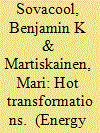

|
|
|
|
|
| Summary/Abstract |
The rapid decarbonisation of heat remains a challenging energy and climate policy priority. In this study, after screening 461 global case studies, we examine four national household transitions in heat, and examine their implications for governance. These transitions were both rapid, involving transformations in heat provision in a short timeframe of 18–35 years; and deep, involving diffusion that collectively reached more than 100 million households and more than 310 million people. From 1995 to 2015, China stimulated industrial research with strong municipal and national targets and policies to the point where they saw adoption rates for solar thermal systems surpass 95% market penetration in many urban areas. From 1976 to 2011, Denmark blended small-scale decentralized community control with national standards and policies to promote district heating so it reached 80% of household needs. From 2000 to 2018, Finland harnessed user and peer-to-peer learning, and innovation, alongside national and European policies and incentives so that heat pumps reached almost a third of all homes. From 1960 to 1977, The United Kingdom coordinated a nationalized Gas Council and Area Boards with industry groups, appliance manufacturers, installers and marketing campaigns so that gas central heating reached almost half of all homes. These four rapid case studies share commonalities in polycentric governance, rooted in (1) equity, (2) inclusivity, (3) information and innovation, (4) ownership and accountability, (5) organizational multiplicity, and (6) experimentation and flexibility. The study affirms that designing the right sort of political and governance architecture can be just as salient as technical innovation and development in stimulating transitions.
|
|
|
|
|
|
|
|
|
|
|
|
|
|
|
|
| 19 |
ID:
176712
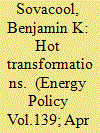

|
|
|
|
|
| Summary/Abstract |
The rapid decarbonisation of heat remains a challenging energy and climate policy priority. In this study, after screening 461 global case studies, we examine four national household transitions in heat, and examine their implications for governance. These transitions were both rapid, involving transformations in heat provision in a short timeframe of 18–35 years; and deep, involving diffusion that collectively reached more than 100 million households and more than 310 million people. From 1995 to 2015, China stimulated industrial research with strong municipal and national targets and policies to the point where they saw adoption rates for solar thermal systems surpass 95% market penetration in many urban areas. From 1976 to 2011, Denmark blended small-scale decentralized community control with national standards and policies to promote district heating so it reached 80% of household needs. From 2000 to 2018, Finland harnessed user and peer-to-peer learning, and innovation, alongside national and European policies and incentives so that heat pumps reached almost a third of all homes. From 1960 to 1977, The United Kingdom coordinated a nationalized Gas Council and Area Boards with industry groups, appliance manufacturers, installers and marketing campaigns so that gas central heating reached almost half of all homes. These four rapid case studies share commonalities in polycentric governance, rooted in (1) equity, (2) inclusivity, (3) information and innovation, (4) ownership and accountability, (5) organizational multiplicity, and (6) experimentation and flexibility. The study affirms that designing the right sort of political and governance architecture can be just as salient as technical innovation and development in stimulating transitions.
|
|
|
|
|
|
|
|
|
|
|
|
|
|
|
|
| 20 |
ID:
103385


|
|
|
|
|
| Publication |
2011.
|
| Summary/Abstract |
This article explores the concept of energy security perceived and understood by a sample of government, business, civil society, and university stakeholders in India. Based on a literature review, the authors hypothesize what energy experts suggest energy security is for India. The article then tests these hypotheses through the use of a survey completed by 172 Indian respondents. The article begins by describing its methodology before summarizing the results of the literature review to distill seven working hypotheses related to energy security in India. These hypotheses relate to (1) security of energy supply, (2) equitable access to energy services, (3) research and development of new energy technologies, (4) energy efficiency and conservation, (5) self-sufficiency and trade in energy fuels, (6) nuclear power, and (7) the energy-water nexus. It then tests these hypotheses with our survey instrument before concluding with implications for energy policy in India and beyond.
|
|
|
|
|
|
|
|
|
|
|
|
|
|
|
|
|
|
|
|
|